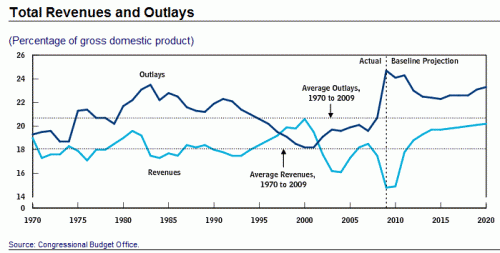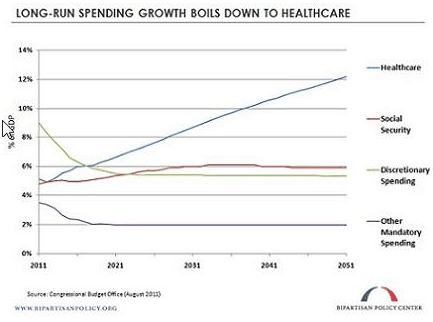The commentary about whether the Super Committee will reach a deal by November 23 is exhausting. Of course they waited until the last minute and yes there is time for a deal, because the outline of what one would look like has been fairly obvious for some time.
Taxes must increase and spending must decrease over current levels (as a percent of GDP) if we are to ever have anything near a balanced budget again.
Historical tax receipts since I have been alive have been around 18% of GDP, and historical spending has been around 20.5% of GDP. Of course, the baby boomers will move into Medicare and Social Security eligibility en masse over the next few decades, making the Simpson-Bowles commission suggestion of seeking balance at 21% of GDP plausible, but hard.
 Health care costs are the central long term problem, and any successful plan will have to include the next steps on health reform that we will actually try. Achieving balance in the future at less than 21% of GDP is mathematically possible, but unrealistic, especially without a credible health policy strategy to get there.
Health care costs are the central long term problem, and any successful plan will have to include the next steps on health reform that we will actually try. Achieving balance in the future at less than 21% of GDP is mathematically possible, but unrealistic, especially without a credible health policy strategy to get there.
In policy terms, it should be possible to agree on some next health reform steps, and there are options that could replace the individual mandate, possibly making the Supreme Court case moot. For example, both parties have suggested setting up exchanges in which persons would purchase private health insurance; they are central to both the ACA and Rep. Ryan’s ideas put forward in the House budget in April, 2011. The big differences are who will be shopping in exchanges, how much subsidy they will receive to do so, and how the subsidy will be updated.
- The ACA would allow the uninsured and persons working for small businesses to purchase insurance in exchanges.
- Ryan’s Medicare proposal would allow those 65 and older, beginning 10 years from now, to do so. Ryan’s Patients’ Choice Act envisions exchanges for those who are younger.
The details are important, and the key question for any exchange is how the subsidy provided by the government will be set and updated? Austin has written lots on competitive bidding and if we are going to try markets, we should try them broadly, evaluate the results and move ahead (in Medicare and for younger persons). The Bipartisan Policy Center has done good work seeking a compromise.
While both parties are quick with their talking points, on health reform (and therefore the long term deficit) the Republicans are more culpable in producing the current gridlock: they are only unified by what they are against, their plans are vague, and they have no track record of using their political capital to drive health reform (remember 218 votes in the House and 60 in the Senate will be needed for replace plans, if President Obama is defeated; 292 and 67 to override his veto). The Republican’s best chance to influence health policy would seem to be through a vehicle like the Super Committee, as part of a larger deal. Both sides should fear what the Supreme Court may rule in the middle of an election.
The only question is whether they can muster the courage to act now, and only they know the answer. Wake me when it is over.
Update: Kaiser Health News with Super Committee wish list from ~ 30 groups.


